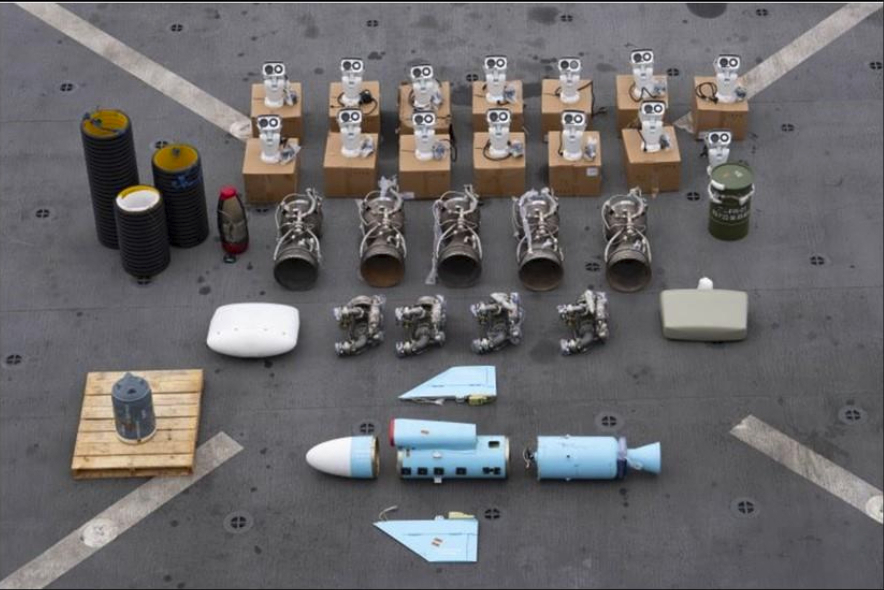The U.S. military should carry out additional strikes and conduct more interdictions in the Middle Eastern waterways targeting the Houthis’ capabilities, according to former head of U.S. Central Command retired Gen. Frank McKenzie.
U.S. forces have carried out multiple strikes against the Houthis this month targeting their capabilities, but the Iranian-backed, Yemen-based Houthi rebels remain undeterred in their desire to continue attacking commercial vessels in the Red Sea.
“I do believe we’re probably going to have to continue these attacks,” McKenzie told the Washington Examiner on Monday. “This is not going to be something that’s going to be over in a day or two, but I believe we do have the ability to reduce Houthi offensive capabilities so we need to stay with it and continue this work.”

Most recently, U.S. forces carried out airstrikes against a Houthi anti-ship missile that was aimed into the Gulf of Aden on Jan. 20 and targeted three Houthi anti-ship missiles that were prepared to launch on Jan. 19. The Houthis struck the Chem Ranger, a Marshall Island-flagged, U.S.-owned and Greek-operated tanker, on Jan. 18, while on the same day, the U.S. struck two Houthi anti-ship missiles that were prepared to launch.
Central Command forces also conducted strikes on 14 Iran-backed Houthi missiles on Jan. 17 that were loaded to be fired in Houthi-controlled areas in Yemen as well. The same day, a one-way attack drone struck the Geneco Picardy, a Marshall Islands-flagged, U.S.-owned and operated bulk carrier ship, in the Gulf of Aden.
The U.S. should target Houthi radars, missile sites, where the missiles are built, and “you may have to think about going after Houthi leadership,” McKenzie added.
Houthi forces have carried out more than 30 attacks in the Red Sea and other nearby waterways since mid-November, mostly targeting commercial vessels and threatening the global shipping markets. The U.S. has created and leads a defensive task force to protect commercial vessels in the region in addition to carrying out these strikes.
U.S. military and administration officials have said Iran is ultimately involved with the Houthi attacks due to its ongoing support for the rebel group.
“What I’ll say is Iran is clearly funding, they’re resourcing, they are supplying, and they’re providing training,” Vice Adm. Brad Cooper, the head of the Navy’s 5th Fleet, told the Associated Press. “They’re obviously very directly involved. There’s no secret there.”
While Iran’s “Axis of Resistance,” or the group of militias and terrorist groups it supports throughout the region, has attacked U.S. interests and personnel in the region since the middle of October, following the start of the war between Israel and Hamas, Tehran has declined to get directly involved.
“We need large strikes here,” McKenzie said of the Houthis. “It will take a significant effort in order to achieve this result. And we shouldn’t be afraid of that because I believe the odds of escalation because of strikes we conduct in Yemen is very slim. I do not believe that striking significant targets in Yemen naturally leads to escalation with Iran.”
Earlier this month, U.S. forces operating from the USS Lewis B. Puller boarded a dhow near the coast of Somalia in international waters of the Arabian Sea, where they found missile components and other weaponry that was believed to be heading from Iran for the Houthis. U.S. forces also recovered propulsion, guidance, and warheads for Houthi medium-range ballistic missiles and anti-ship cruise missiles.
Two of the Navy SEALs involved in the mission were lost at sea and are now presumed dead. They were identified as Navy Special Warfare Operator 1st Class Christopher Chambers and Navy Special Warfare Operator 2nd Class Nathan Ingram.
CLICK HERE TO READ MORE FROM THE WASHINGTON EXAMINER
“We need to couple our strikes in Yemen with an even more aggressive interdiction program, where we attempt to remove these capabilities because, look, the Iranians are clearly supplying them with them. They’ve been doing it for years,” McKenzie added. “If we can cut that off, we can make it much easier to get the Houthis to near zero on their capabilities with offensive weapons, but the two go very much hand in glove.”
The Houthis’ attacks have forced some commercial shipping companies to reroute their products on much longer transits around the southern tip of South Africa instead of traveling through the Red Sea and the Suez Canal.
